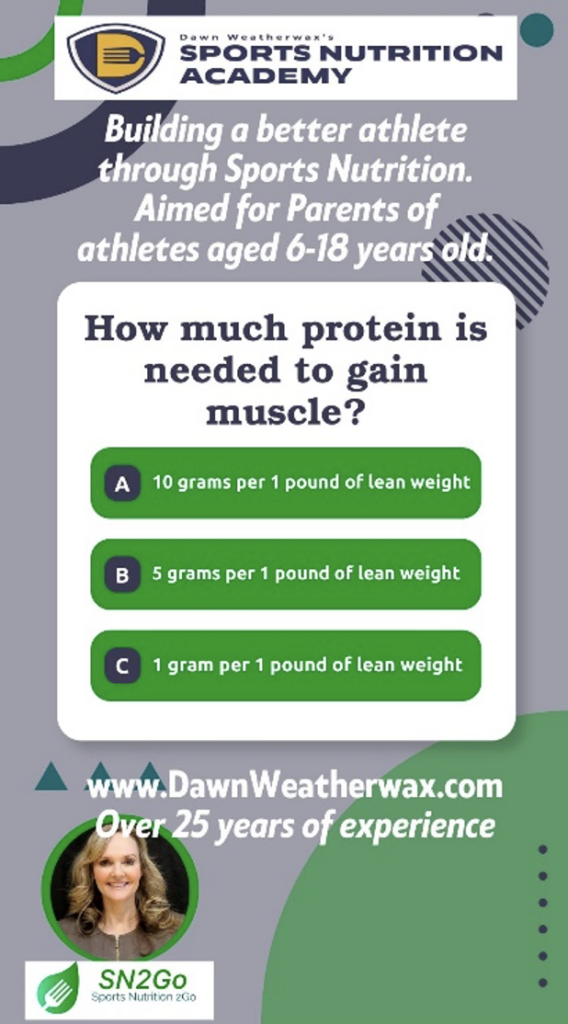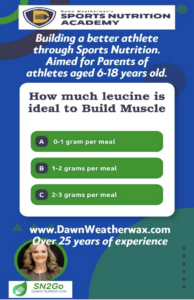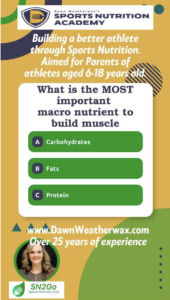Muscle Building IQ: Test your Sports Nutrition Knowledge!
By Dawn Weatherwax, RD, LD, ATC, CSCS
 Dawn Weatherwax is a Registered/Licensed Dietitian with a specialty in Sports Nutrition and Founder of Sports Nutrition 2Go & Dawn Weatherwax’s Sports Nutrition Academy. She has been working with athletes for over 25 years. In addition, she is an Athletic Trainer with a Certification in Strength and Conditioning from The National Strength and Conditioning Association. Weatherwax brings a comprehensive and unique understanding of the athlete’s body, and its nutritional needs, to those interested in achieving specific performance goals and optimal health. She is also the author of The Official Snack Guide for Beleaguered Sports Parents, The Complete Idiot’s Guide to Sports Nutrition and The Sports Nutrition Guide for Young Athletes. She has also been featured on television and magazines including Good Morning America, MSNBC, Oxygen, Spark and Shape.
Dawn Weatherwax is a Registered/Licensed Dietitian with a specialty in Sports Nutrition and Founder of Sports Nutrition 2Go & Dawn Weatherwax’s Sports Nutrition Academy. She has been working with athletes for over 25 years. In addition, she is an Athletic Trainer with a Certification in Strength and Conditioning from The National Strength and Conditioning Association. Weatherwax brings a comprehensive and unique understanding of the athlete’s body, and its nutritional needs, to those interested in achieving specific performance goals and optimal health. She is also the author of The Official Snack Guide for Beleaguered Sports Parents, The Complete Idiot’s Guide to Sports Nutrition and The Sports Nutrition Guide for Young Athletes. She has also been featured on television and magazines including Good Morning America, MSNBC, Oxygen, Spark and Shape.
Did you know?
- The average adult after the age of 30 could lose up to two pounds of lean weight a year if they do not add some resistance training and proper nutrition to maintain it.
- Did you know to build muscle even at a very young age it needs certain nutrients at the right time to maximize its development?
How many of you would like your athletes to:
- Gain lean weight!
- Grow when they are supposed to grow!
- Optimize their health, growth & athleticism!
- Stay injury free!
This Quiz is going to focus on one main nutrient. Please test your muscle building IQ.
1. What is the MOST important macronutrient to build muscle?
B. Fat
C. Protein
C: Protein is a macro nutrient. It is one of the three nutrients found in food that the body needs in large amounts. Every cell in the human body contains protein. It is essential for the maintenance, repair and building of your muscles, organs, and immune system since they are mostly made up of protein. The basic structure of protein is a chain of amino acids. You need protein in your diet to help your body repair cells and make new ones. Protein is also important for growth and development in children and teens. Proteins are made of small compounds called amino acids. These amino acids build, maintain, and replace the tissues in your body.
To know how much protein, carbohydrates and healthy fats you are consuming I highly recommend using the Free Cronometer app
In our Dawn Weatherwax’s Sports Nutrition Academy, we have detailed menus that have macronutrients well balanced to optimize growth, health and athleticism. www.dawnweatherwax.com
2. How MUCH protein is recommended to gain muscle?
 A. 10 grams of protein per pound of body weight
A. 10 grams of protein per pound of body weight
B. 5 grams of protein per pound of body weight
C. 1 gram of protein per pound of body weight
C: 1 gram per pound of lean weight or .45g per kg.
To know exactly the minimum amount of protein needed then it is critical the person knows their lean weight. Lean weight is everything but fat. At my office we have a Bod Pod™ that measures body composition. We go by 1g of protein minimally per pound of lean weight.
Example: 6’4″, 250lb, 28% body fat (250 x .28) = 180lb of lean weight.
That means they need at least 180 grams of protein daily NOT 250 grams. That is a big difference.
To know how many grams of protein you are eating I recommend using the Free Cronometer app
In our Dawn Weatherwax’s Sports Nutrition Academy, we have detailed menus that have the protein already optimized in the right amounts to save you time and take out the guess work. www.dawnweatherwax.com
3. What is the OPTIMAL way to eat protein to gain lean weight?
B. Breakfast & Supper
C. Spread evenly throughout the day.
C. The muscle is like a sponge it can only absorb so much at one time. If an athlete skips breakfast and doubles the protein at lunch, the muscle cannot absorb it all. Therefore, they missed an opportunity.
Example: 6’4″, 250lb, 28% body fat (250 x .28) = 180lb of lean weight
If ate 5x a day (every 3-4 hours 180/5) = ~36g protein per meal ~5oz cooked
To know how many grams of protein you are eating I recommend using the Free Cronometer app
In our Dawn Weatherwax’s Sports Nutrition Academy, we have detailed menus that have the protein already optimized in the right amounts to give you a head start. www.dawnweatherwax.com
4.What is the MOST important essential amino acid to build muscle?
B. Leucine
C. Valine
B: Leucine
The basic structure of protein is a chain of amino acids. Leucine is an amino acid, one of 20 building blocks that commonly show up in human protein structures. It is also one of nine essential amino acids (EAA), in that we can’t make it in our body and must consume through food.
Leucine is also a branched chain amino acid (BCAA), meaning that unlike 17 of the 20 amino acids with a straight side chain, leucine is one of three where they have a side chain (A flash back to organic chemistry). One of leucine’s main purpose is to turn on protein synthesis.
If the athlete is lacking this amino acid at the right times, they will not optimize growth, health & athleticism.
How can you track how much leucine you are getting per meal? The Cronometer app is free and tracks leucine.
In our Dawn Weatherwax’s Sports Nutrition Academy, we have detailed menus that have the protein and leucine already optimized to maximize growth, health & athleticism. www.dawnweatherwax.com
5. How MUCH leucine is ideal to build muscle?
 A. 0-1 gram of leucine per meal
A. 0-1 gram of leucine per meal
B. 1-2 grams of leucine per meal
C. 2-3 grams of leucine per meal
C: 2-3 grams of leucine per meal
How can you track how much leucine you are getting per meal? The Cronometer app is free and tracks leucine.
In our Dawn Weatherwax’s Sports Nutrition Academy, we have detailed menus that have the protein and leucine already optimized in the right amounts to save time and take out the guess work. www.dawnweatherwax.com
6. What foods have the LOWEST amount of leucine per serving?
B. Beans, chickpeas, lentils
C. Beef, chicken, fish, yogurt
A. Nuts, peanuts, seeds
Nut/Peanuts/Seeds Avg: 0.3-0.5g
Beans/Lentils/Peas Avg 0.4-0.8g
Dairy/Meat Avg: 0.7-2.5g
| Leucine amounts vary per product
Use table as a guideline *Cooked |
|
| Dairy Avg: 0.7-2.5g per serving | |
| Milk | .8g/cup |
| Yogurt, Greek | 1.1g/7oz |
| Cheddar Cheese | 0.7g/1oz |
| Whey Isolate | 2.5g/25g |
| Meat Avg: 1.8g per serving | |
| Beef, ground* | 1.8g/3oz |
| Pork chop, lean
boneless* |
1.8g/3oz |
| Chicken breast,
Boneless* |
1.8g/3oz |
| Grain Avg: 0.1-0.2g | |
| White bread | 0.2g/1oz slice |
| Whole Wheat Bread | 0.1g/1oz slice |
| Corn tortilla | 0.1g/6” |
| White rice* | 0.2g/½ cup |
| Brown rice | 0.2g/½ cup |
| Corn | 0.2g/½ cup |
| Quinoa* | 0.2g/½ cup |
| Soy Avg: 0.8-1.9g | |
| SOYBEANS/Edamame* | 0.8g/ ½ cup |
| Soy milk | 0.6g/8oz |
| Tempeh | 1.2g/ ½ cup |
| Tofu, extra firm | 0.8g/3oz |
| Soy protein isolate | 1.9g/25g |
| Beans/Lentils/PEAS Avg: 0.4-0.8g | |
| Black beans* | 0.6g/ ½ cup |
| Red beans* | 0.5g/ ½ cup |
| Pinto beans* | 0.7g/ ½ cup |
| Lentils* | 0.7g/ ½ cup |
| CHICKPEAS* | 0.4g/ ½ cup |
| Split peas* | 0.6g/ ½ cup |
| Potatoes: 0.2g | |
| Potatoes* | 0.2g/ ½ cup/mashed |
| Sweet potatoes* | 0.2g/ ½ cup/mashed |
| Nut/Peanuts/Seeds Avg: 0.3-0.5g | |
| Peanuts | 0.5g/1 oz raw/ ¼ cup |
| Peanut butter | 0.5g/ 2 Tbsp |
| Almonds | 0.4g/ 1oz raw |
| Cashews | 0.4g/ 1oz raw |
| Hazelnuts | 0.3g/1 oz raw |
| Walnuts | 0.3g/1oz raw |
| Sunflower Seeds | 0.5g/1oz raw |
How can you track how much leucine you are getting per meal? The Cronometer app is free and tracks leucine.
In our Dawn Weatherwax’s Sports Nutrition Academy, we have detailed menus that have the protein already optimized every day of growth and trainings.
7. Do you ADD more protein if you are not gaining weight/muscle?
B. No
C. Maybe
C: Maybe
The Quick rule is 1g of protein per pound of lean weight and 2-3g of leucine per meal
If a young athlete is meeting these goals, then they need to add more fuel from carbohydrates and healthy fats, NOT protein!
In our Dawn Weatherwax’s Sports Nutrition Academy, we have detailed menus that have the protein carbohydrates and healthy fats already optimized in the right amounts to save time and take out the guess work.
8. Are protein powders safe for a healthy athlete under 18 years old?
B. No
C. Maybe
C: Maybe
As long as they are just protein, carbohydrates and fats and used in the right amounts.
To ensure the safety and quality go with NSF sports certified products or Organic whenever possible.
You want to avoid added nonfood products such as glutamine, creatine etc…
Additions that are good are probiotic and enzyme sources.
If it is sweetened you want ones who mainly use stevia & monk fruit. Other options are sugar alcohols.
Here is a label from Klean Athlete: Chocolate NSF Sport
1 scoop 20g protein
~2g of Leucine
Other ingredients: Whey protein isolate (milk), cocoa (fat), erythritol (sugar alcohol), natural flavor, sunflower lecithin (fat), salt, stevia leaf extract (Rebaudioside A), monk fruit extract
Garden of Life plant based raw Protein no flavor
1 scoop 22g protein
Leucine 1.8g
Organic
All Food/Nutrition Fact
In my Dawn Weatherwax’s Sports Nutrition Academy we have protein supplement recommendations to give you a piece of mind.
SUMMARY
Protein along with leucine is powerful! It’s vital for tissue growth, repair and maintenance – all important issues for athletes. It is important to know how much is needed and when to ensure getting enough to maximize development and training efforts.





